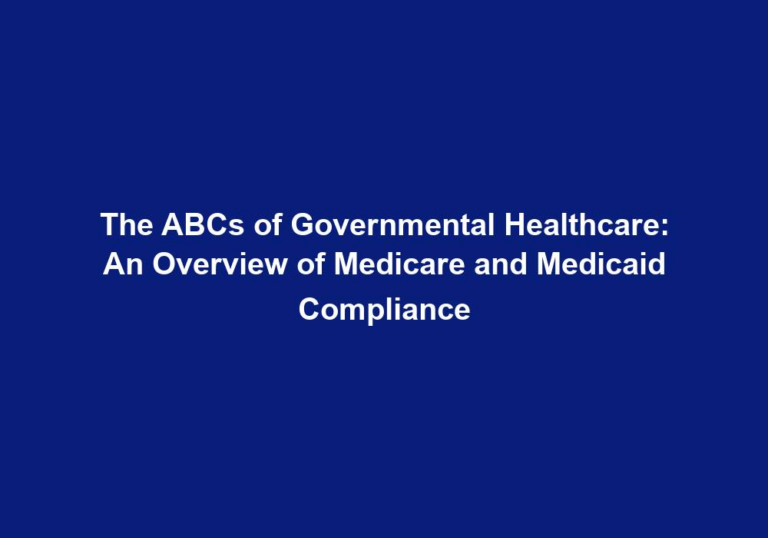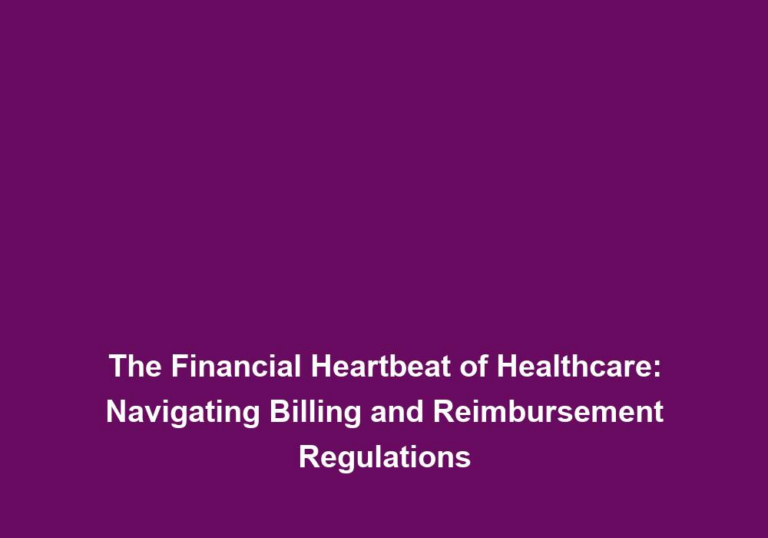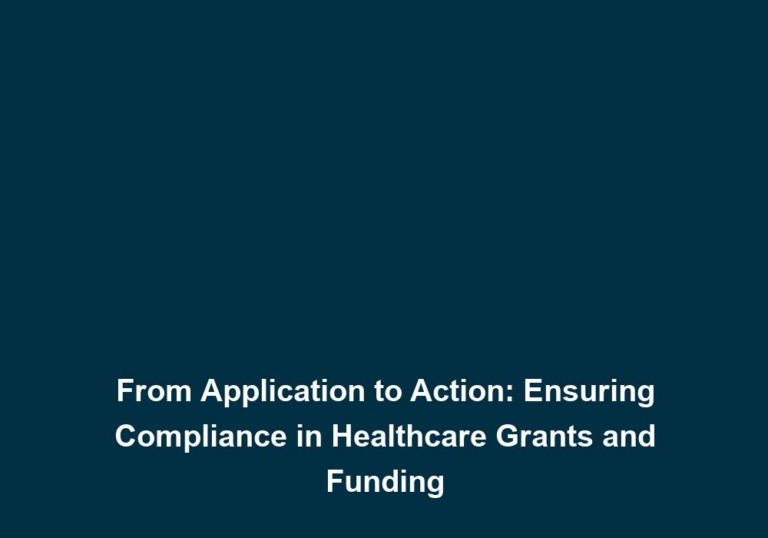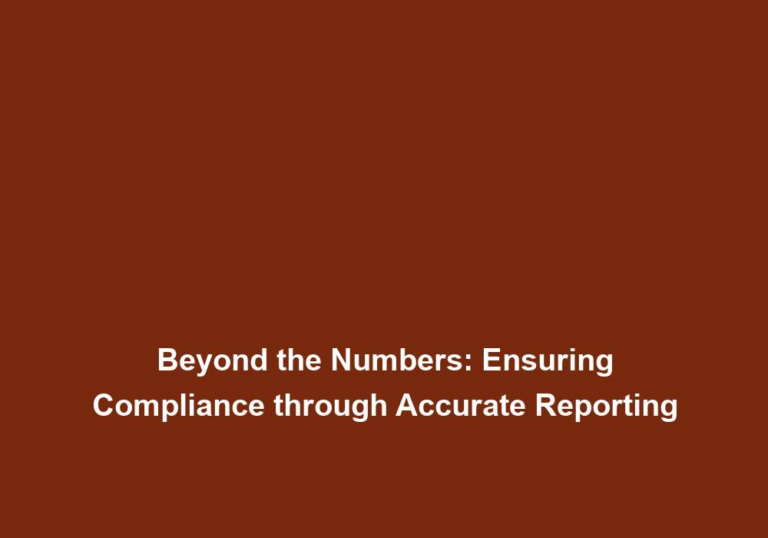Ensuring Financial Integrity: Key Aspects of Audits and Reporting in Healthcare
In the healthcare industry, maintaining financial integrity is of utmost importance. Healthcare organizations handle vast amounts of financial data, making it crucial to have robust systems in place to ensure accuracy, transparency, and compliance. Audits and reporting play a pivotal role in achieving this goal. This article delves into the key aspects of audits and reporting in healthcare, emphasizing their significance and outlining best practices to ensure financial integrity.
Introduction to Audits in Healthcare
Audits in healthcare refer to the systematic examination of financial records, processes, and operations to verify their accuracy, completeness, and compliance with relevant regulations and industry standards. These audits are essential to identify any discrepancies, risks, or potential fraudulent activities that may impact an organization’s financial integrity.
In healthcare, audits are conducted to ensure the financial accuracy of the organization. They involve a comprehensive review of financial records, including transactions, invoices, and financial statements, to ensure their accuracy and completeness. By meticulously examining the data, audits help identify and rectify any errors or discrepancies, providing a reliable financial foundation.
Audits also play a crucial role in risk mitigation within healthcare organizations. They help identify potential risks and vulnerabilities in financial processes, internal controls, and compliance. By uncovering these risks, healthcare organizations can take proactive measures to mitigate them and strengthen their financial integrity. This includes evaluating internal controls, risk management practices, and adherence to policies and procedures.
Furthermore, audits act as a powerful tool to detect and prevent fraudulent activities within the healthcare organization. By thoroughly examining financial records and transactions, audits can uncover any suspicious or fraudulent activities, safeguarding the organization’s financial assets. This helps protect the organization from financial losses and reputational damage.
Types of Audits in Healthcare
1. External Audits
External audits are conducted by independent third-party accounting firms to evaluate an organization’s financial statements and records. These audits provide an unbiased assessment of financial integrity and help identify areas for improvement. External auditors bring objectivity and expertise to the audit process, ensuring the thorough examination of financial records and compliance with industry standards. They review the organization’s financial statements, transactions, and internal controls to provide an independent opinion on the financial accuracy and compliance of the organization.
2. Internal Audits
Internal audits, on the other hand, are conducted by internal teams within the healthcare organization itself. These audits focus on evaluating internal controls, risk management practices, and adherence to policies and procedures. Internal auditors assess the effectiveness and efficiency of financial operations, identify areas of improvement, and provide recommendations for enhancing financial integrity. They play a crucial role in ensuring that internal control systems are adequate and effective in safeguarding the organization’s financial assets.
3. Compliance Audits
Compliance audits ensure that healthcare organizations comply with relevant laws, regulations, and industry standards. These audits assess whether the organization’s financial practices and operations align with legal requirements and industry guidelines. Compliance auditors review financial records, policies, procedures, and internal controls to ensure adherence to regulatory requirements. They help healthcare organizations identify any gaps in compliance and take corrective actions to avoid penalties and legal consequences.
4. Operational Audits
Operational audits analyze the efficiency and effectiveness of an organization’s financial operations. These audits evaluate processes, workflows, and resource utilization to identify areas of improvement and cost-saving opportunities. Operational auditors review financial processes, such as revenue cycle management, billing, and procurement, to identify inefficiencies, risks, and opportunities for process optimization. They provide recommendations to enhance financial performance, reduce costs, and improve overall operational efficiency.
Importance of Audits in Healthcare
1. Financial Accuracy
Audits play a crucial role in ensuring the accuracy of financial records, statements, and transactions within the healthcare organization. By meticulously examining the data, audits help identify and rectify any errors or discrepancies, providing a reliable financial foundation. This accuracy is essential for financial decision-making, budgeting, forecasting, and financial reporting. It ensures that the financial information used for decision-making is reliable, enabling healthcare organizations to make informed and strategic financial decisions.
2. Risk Mitigation
Audits help identify potential risks and vulnerabilities in financial processes, internal controls, and compliance. By uncovering these risks, healthcare organizations can take proactive measures to mitigate them and strengthen their financial integrity. This includes implementing adequate internal controls, enhancing risk management practices, and ensuring compliance with relevant regulations and industry standards. By mitigating risks, healthcare organizations can protect their financial assets, reputation, and overall financial well-being.
3. Fraud Detection
Audits act as a powerful tool to detect and prevent fraudulent activities within the healthcare organization. By thoroughly examining financial records and transactions, audits can uncover any suspicious or fraudulent activities, safeguarding the organization’s financial assets. This helps protect the organization from financial losses and reputational damage. Auditors use various techniques, such as data analysis, forensic accounting, and internal control evaluations, to identify potential red flags and signs of fraud. By detecting and preventing fraud, audits contribute to maintaining financial integrity and trust within the healthcare industry.
Reporting in Healthcare
Reporting in healthcare involves the documentation and communication of financial information to various stakeholders, including regulatory authorities, investors, boards of directors, and internal management. Accurate and timely reporting is crucial to ensure transparency, accountability, and informed decision-making.
1. Financial Statements
Financial statements provide a comprehensive overview of an organization’s financial performance, including balance sheets, income statements, and cash flow statements. These statements are essential for external reporting and analysis. They provide stakeholders with a clear picture of the organization’s financial health, liquidity, profitability, and cash flow. Financial statements also help investors, creditors, and regulatory authorities assess the organization’s financial stability, compliance, and overall financial integrity.
2. Regulatory Reporting
Healthcare organizations are often required to report financial information to regulatory bodies, such as government agencies and insurance providers. Compliance with regulatory reporting requirements is vital to maintain transparency and comply with legal obligations. Regulatory reports include information on financial performance, patient billing, reimbursement, and compliance with healthcare regulations. Accurate and timely regulatory reporting ensures that healthcare organizations meet legal requirements, avoid penalties, and maintain their reputation as responsible and compliant entities.
3. Management Reporting
Management reporting involves the internal communication of financial information to support strategic decision-making. These reports provide insights into financial performance, trends, and key metrics to assist management in driving organizational growth and efficiency. Management reports may include budget variance analysis, financial forecasts, key performance indicators (KPIs), and financial analysis of specific projects or departments. Accurate and timely management reporting enables healthcare organizations to identify areas of improvement, make data-driven decisions, and allocate resources effectively.
4. Board Reporting
Reporting financial information to the board of directors is crucial for governance and oversight. Board reports typically include financial performance summaries, key risks, compliance updates, and strategic recommendations. Board reports provide the board of directors with a comprehensive understanding of the organization’s financial health, performance, and risks. They facilitate informed decision-making, strategic planning, and effective governance. Accurate and concise board reports help the board of directors fulfill their fiduciary responsibilities and ensure the long-term financial sustainability of the healthcare organization.
Best Practices for Audits and Reporting in Healthcare
1. Establish Strong Internal Controls
Healthcare organizations should implement robust internal control systems to ensure the accuracy, integrity, and security of financial data. This includes segregation of duties, regular reconciliations, and stringent authorization processes. Internal controls help prevent errors, fraud, and unauthorized access to financial information. They provide a framework for the organization to maintain financial integrity, comply with regulations, and safeguard its assets.
2. Invest in Technology
Leveraging advanced financial software and data analytics tools can streamline audits and reporting processes. Automation can improve accuracy, reduce manual errors, and provide real-time insights for better decision-making. Healthcare organizations should invest in financial management systems, data analytics software, and electronic health record (EHR) systems that integrate with financial data. These technologies enable efficient data collection, analysis, and reporting, enhancing the organization’s financial integrity and operational efficiency.
3. Regular Training and Education
Continuous training and education programs are essential to keep financial staff updated with the latest industry regulations, accounting practices, and fraud detection techniques. This helps enhance the effectiveness and efficiency of audits and reporting. Healthcare organizations should provide regular training sessions, workshops, and online courses to educate financial staff on compliance, internal controls, data privacy, and ethical practices. By investing in the professional development of financial staff, healthcare organizations can ensure the competence and knowledge required to maintain financial integrity.
4. Engage Independent Auditors
Collaborating with independent auditors adds an extra layer of credibility to the audit process. External auditors bring objectivity and expertise, ensuring the thorough examination of financial records and compliance with industry standards. Healthcare organizations should engage reputable accounting firms with experience in the healthcare industry to conduct external audits. Independent auditors provide an unbiased assessment of financial integrity, identify areas for improvement, and offer valuable insights for enhancing financial processes and controls.
5. Maintain Documentation
Proper documentation of financial transactions, audit processes, and reporting is crucial for future reference and compliance. Organizations should establish well-organized systems for storing and retrieving financial documents. This includes maintaining comprehensive audit trails, documenting internal control procedures, and archiving financial records. Proper documentation facilitates transparency, accountability, and compliance with regulatory requirements. It also helps healthcare organizations respond to audit inquiries, regulatory inspections, and legal disputes effectively.
In conclusion, audits and reporting play a vital role in ensuring financial integrity within the healthcare industry. By conducting thorough audits, healthcare organizations can identify risks, detect fraud, and maintain accurate financial records. Effective reporting practices enable transparent communication with stakeholders, supporting informed decision-making. By adhering to best practices and embracing technological advancements, healthcare organizations can enhance their financial integrity and safeguard their long-term success.







